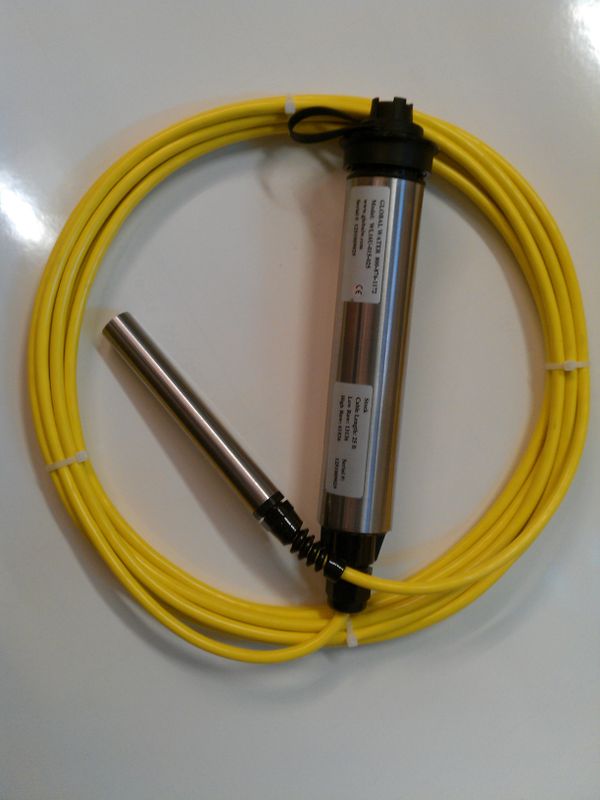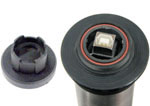Difference between revisions of "Piezometer-2"
From Help Wiki
(Created page with '<!-- Piezometer-2 Instrument Page --> Piezometer-2 <br/> <br/> [http://en.wikipedia.org/wiki/Piezometer Wikipedia entry] <br/> <br/…') |
|||
| Line 13: | Line 13: | ||
<br/> | <br/> | ||
---- | ---- | ||
| + | <br/> | ||
| + | <br/> | ||
| + | <span style="color: black; text-decoration: underline; font-weight:bold; font-size: 14pt">Troubleshooting Tips</span> | ||
| + | * If the software cannot communicate with the instrument, assuming the instrument is connected via the USB port, check the two [http://en.wikipedia.org/wiki/9v_battery 9v batteries]; if the batteries are discharged, it will not be possible to communicate with instrument. | ||
| + | ** Depending on the sampling rate set on the instrument, the batteries can discharge rather quickly; the batteries will also be affected by temperature, especially cold temperatures. | ||
| + | ** Use a [http://en.wikipedia.org/wiki/Lithium_battery 9v lithium battery]. | ||
| + | <br/> | ||
====== Notes ====== | ====== Notes ====== | ||
* In order to communicate with the instrument, Global Water's Global Logger software needs to be installed --compatible with Windows only. Install the software before manually installing the drivers. | * In order to communicate with the instrument, Global Water's Global Logger software needs to be installed --compatible with Windows only. Install the software before manually installing the drivers. | ||
** During the software installation process, at the tail end, there is a [http://en.wikipedia.org/wiki/Modal_window modal window] that remains hidden behind the parent installer window; make sure to drag the parent window to make the modal window visable. | ** During the software installation process, at the tail end, there is a [http://en.wikipedia.org/wiki/Modal_window modal window] that remains hidden behind the parent installer window; make sure to drag the parent window to make the modal window visable. | ||
* Two drivers must be installed for the instrument to properly communicate with Global Loger: | * Two drivers must be installed for the instrument to properly communicate with Global Loger: | ||
| − | # USB to serial driver | + | # USB to serial (virtual COM port emulator) driver |
| − | # device driver for the instrument | + | # USB device driver for the instrument |
| − | + | <br/> | |
| + | {| class="wikitable" | ||
| + | |+ '''Default COM Settings''' | ||
| + | ! Default Setting !! Default Value | ||
| + | |- | ||
| + | | align="Left" | COM # | ||
| + | | align="Right" | 4 | ||
| + | |- | ||
| + | | align="Left" | BAUD rate | ||
| + | | align="Right" | 38400 | ||
| + | |- | ||
| + | | align="Left" | Data bits | ||
| + | | align="Right" | 8 | ||
| + | |- | ||
| + | | align="Left" | Parity | ||
| + | | align="Right" | None | ||
| + | |- | ||
| + | | align="Left" | Stop bits | ||
| + | | align="Right" | 1 | ||
| + | |- | ||
| + | | align="Left" | Flow Control | ||
| + | | align="Right" | None | ||
| + | |- | ||
| + | |} | ||
| + | * ''Check Windows device manager for the current COM port number; default installation will assign COM 4''. | ||
** It's possible to change the BAUD rate from "Auto" to another setting on the instrument itself, but <span style="color: red; text-decoration: none; font-weight:bold; font-size: 12pt">do not do this.</span> If there's a communication problem between the software and instrument it's possible that the BAUD rate was changed within the instrument, which means each of the BAUD rates will have to be iterated through from the PC's COM settings. | ** It's possible to change the BAUD rate from "Auto" to another setting on the instrument itself, but <span style="color: red; text-decoration: none; font-weight:bold; font-size: 12pt">do not do this.</span> If there's a communication problem between the software and instrument it's possible that the BAUD rate was changed within the instrument, which means each of the BAUD rates will have to be iterated through from the PC's COM settings. | ||
* The instrument has a USB interface: | * The instrument has a USB interface: | ||
Revision as of 10:56, 12 February 2013

Wikipedia entry
Manuals
Information Schema
Troubleshooting Tips
- If the software cannot communicate with the instrument, assuming the instrument is connected via the USB port, check the two 9v batteries; if the batteries are discharged, it will not be possible to communicate with instrument.
- Depending on the sampling rate set on the instrument, the batteries can discharge rather quickly; the batteries will also be affected by temperature, especially cold temperatures.
- Use a 9v lithium battery.
Notes
- In order to communicate with the instrument, Global Water's Global Logger software needs to be installed --compatible with Windows only. Install the software before manually installing the drivers.
- During the software installation process, at the tail end, there is a modal window that remains hidden behind the parent installer window; make sure to drag the parent window to make the modal window visable.
- Two drivers must be installed for the instrument to properly communicate with Global Loger:
- USB to serial (virtual COM port emulator) driver
- USB device driver for the instrument
| Default Setting | Default Value |
|---|---|
| COM # | 4 |
| BAUD rate | 38400 |
| Data bits | 8 |
| Parity | None |
| Stop bits | 1 |
| Flow Control | None |
- Check Windows device manager for the current COM port number; default installation will assign COM 4.
- It's possible to change the BAUD rate from "Auto" to another setting on the instrument itself, but do not do this. If there's a communication problem between the software and instrument it's possible that the BAUD rate was changed within the instrument, which means each of the BAUD rates will have to be iterated through from the PC's COM settings.
- The instrument has a USB interface:
- When the instrument is not in use or going to be stored, it should be set to not log by configuring it to log once every 180 days (or longer duration), in order to preserve the internal battery life.

